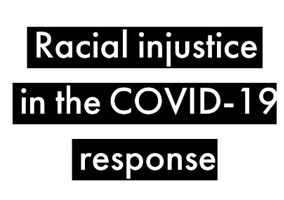Two weeks into lockdown, the campaign group #CharitySoWhite published a position paper outlining the risks and impacts of Covid-19 on racial inequalities within the UK.
The report highlighted the disproportionate impact of the pandemic on people from black, Asian and minority ethnic (BAME) backgrounds, the consequences for BAME employees across the sector, and the importance of prioritising support for specialist BAME charities.
It published five principles that it said should guide the sector’s response to the crisis, in order that racial injustices are not perpetuated or intensified:
- Address racial inequalities in the sector.
- Acknowledge who holds power.
- Value lived experience.
- Trust the BAME voluntary sector.
- Recognise and support BAME staff and volunteers.
Alongside this, #CharitySoWhite coordinated an open letter to the government calling for relief packages to be ring-fenced for BAME organisations, which has since attracted more than 95 signatories. The letter read: “In the aftermath of Grenfell we saw emergency funding diverted to large, non-BAME charities. These charities, already the most resilient and best positioned to raise funds, continued to thrive, whilst small, local BAME-led groups who were on the front lines leading relief efforts were sidelined. Unless we act now, history will repeat itself, this time with even more grave and long lasting consequences. BAME VCS groups must be at the heart of decision-making in any relief package to the sector.”
It is estimated that there are between 9,000 and 10,000 BAME charities and community groups operating across the UK; 65% with incomes of less than £10,000.
The letter called on all those involved in discussions about the government relief package to:
- Ensure that there are at least two individuals on steering or oversight groups for funding set up who have a significant track record of championing race equality in funding, and
- Ensure 20% of funding is ringfenced for BAME VCS groups, managed directly by BAME infrastructure organisations.
Disproportionate impacts
Since #CharitySoWhite made these calls, evidence has been mounting about the disproportionate impact of the pandemic on BAME groups, both in healthcare and economic terms.
Research published by the Intensive Care National Audit and Research Centre about the first 2,000 patients critically ill with Covid-19 in UK hospitals indicated that 35% were non-white.
By 23 April, official figures showed that 111 health and social care workers had died from the virus, and an analysis by Sky News found that 72 per cent of these were from BAME communities. New NHS guidance recommends that BAME staff should be risk-assessed and taken off the front line if they are deemed to be at high risk of contracting Covid-19.
A report from the Institute of Fiscal Studies on 1 May showed that the death rate among British black Africans and British Pakistanis from coronavirus in English hospitals was more than 2.5 times that of the white population, while deaths of people from a black Caribbean background were 1.7 times higher than for white Britons.
And a survey of just over 1,500 British adults by BMG on 7-9 April for the Independent revealed that people from BAME households were almost twice as likely as white Britons to report having lost income and jobs as a result of the pandemic.
Deputy director of the Runnymede Trust, Dr Zubaida Haque wrote in the Huffington Post that “structural health, housing and labour market inequalities place BME groups at much higher risk of severe illness and mortality from Covid-19”.
The government has announced an investigation into the disparities but a campaign called #WeNeedAnswers, spearheaded by the Ubele Initiative, argues that an independent public inquiry is needed.
Funding for BAME sector
In late March, the Ubele Initiative surveyed 165 BAME community organisations and found that close to nine in ten could close over the next three months, due to their low levels of reserves. Those most affected were groups with incomes of less than £100,000. If they were to close, a projected 15,000 to 20,000 users per week would lose their services.
Acevo CEO Vicky Browning joined a call with officials from the Department for Digital, Culture, Media and Sport about the government’s support package on 9 April, and asked what measures are being put in place to ensure the distribution of funds takes into account issues of race equity. She reported afterwards: “One of the subsectors DCMS is interested in is those that have specific health issues related to Covid-19, of which BAME communities are an important part.
“DCMS wants to work with organisations supporting those communities, as does the National Emergencies Trust, which wants to reach out specifically to BAME groups to make sure no one is left out. The National Lottery Community Fund (NLCF) also said it will continue to run every decision through its diversity and inclusion lens and welcomed feedback if there is something it should be doing differently.”
On 24 April the NLCF published a statement about its commitments to equity, diversity and inclusion issues in the pandemic. A senior official from the Fund was also planning to meet with around 30 specialist BAME organisations in late April and early May.
But #CharitySoWhite said that these efforts “fall very much short” of its calls for action as outlined in the open letter. Its campaign to put BAME groups at the heart of the government’s and sector’s response to the pandemic continues.
Related articles












